Students got a realistic view into the supposed prosperity of Sweden’s economy at a talk hosted Monday night by the UT Mises Circle in Waggener Hall. Computer science junior Michael Goldstein, who co-founded the Mises Circle last spring along with former UT students George McHugh and Jose Nino, hosted the talk.
“Our goal was to create a forum for economics in the tradition of the Austrian school, which focuses on the logic of human action as the basis of economic theory,” Goldstein said.
The Austrian School of Economics, on which the Mises Circle bases its philosophy, was developed in part by Ludwig von Mises, a 20th century Austrian economist. Mises also developed the theory of praxeology, which seeks to explain the effects of actions by individuals.
The Mises Circle talk, titled The Myth of Sweden, sought to explain the current economic state of Sweden based on its perceived success as a capitalist country with an expansive welfare system.
Per Bylund, a Swedish professor of entrepreneurship at the University of Missouri, participated in the talk via live webcast. Bylund said that while there is a myth of Sweden’s economy being among the finest in the world, high income taxes and an unsustainable degree of socialization are the realities.
“Things are not what they look like,” Bylund said. “Sweden is really a subsidized market with exploited workers.”
Bylund said even though Sweden may have extensive welfare programs, such as free health care, public schooling — students are actually paid to go to school, but also have a legal obligation to do so — and social security, the government uses these programs as an incentive for workers to pay high taxes into the system.
Despite the large amounts of benefits, Bylund said Sweden’s welfare system has caused a devaluation of its currency, known as the krona, and restricted access to healthcare in order to keep treatment costs low. This resulted in patients being placed on waiting lists for as long as 18 months just to be treated.
“Government presents us with a view of economics that is very different from what most economic professors would say and the opposite of what Austrian Economics would say,” said Daniel Krawisz, software engineering graduate student and a member of the Mises Circle. “Economics is important to make informed choices about politics.”
Krawisz said that the Mises Circle is open to students willing to learn about economics. The Mises Circle meets every Monday at 7 p.m. to discuss economic theory.
“We would like to see people who are informed, but who are ready to disagree,” Krawisz said. “It helps us to refine our ideas.”




















